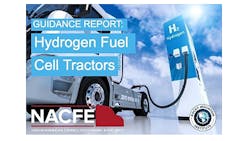NACFE releases guidance report on hydrogen fuel cell tractors
The North American Council for Freight Efficiency (NACFE) released its latest Guidance Report, Making Sense of Heavy Duty Hydrogen Fuel Cell Tractors.
“Almost every day there is a new announcement about hydrogen fuel cell electric trucks,” said Rick Mihelic, director of emerging technologies and study team manager, NACFE. “Even with all the information, there are a lot of unanswered questions. We published this report to help make sense of hydrogen for commercial freight movement.”
Key findings from the report include:
- Hydrogen fuel cells trucks are just starting to see real-world use and their adoption is being driven by regional or national considerations that are much bigger than what exists for trucking fleets.
- Battery electric trucks should be the baseline for hydrogen fuel cells electric vehicle (HFCEV) comparisons, rather than any internal combustion engine alternative.
- As for all alternatives, fleets should optimize the specifications of HFCEVs for the job they should perform while expecting that the trade cycles will lengthen.
- The future acceleration of HFCEVs is likely not about the vehicles and fueling but resides mostly on the creation and distribution of the hydrogen itself.
- Finally, the potential for autonomous fuel cell trucks to operate 24-hours a day adds significant opportunity for making sense of capital and operational investment in hydrogen.
“While hydrogen fuel cell technology is very promising, we know that widespread adoption will take time,” said Amy Davis, president of new power business, Cummins. “Many factors will influence this, including emissions regulations, infrastructure, hydrogen availability, and total costs of ownership. Buses and trains will likely be some of the first applications to transition to hydrogen, with the Hydrogen Council predicting that heavy duty trucks will fall further out on the curve with about 2.5 percent of hydrogen adoption in 2030.”
The report also offers fleets some recommendations on how to proceed with hydrogen fuel cell electric truck exploration.
- Fleet investment in new fuel cell electric and battery electric vehicles requires vehicles. The debate on infrastructure is irrelevant if there is no demand.
- Hydrogen is a regional solution, cheap hydrogen even more so. The ability to scale truck demand will be limited by the nature of truck production volumes and market forces.
- Purists pushing green hydrogen as a goal should accept that some compromise is needed to allow alternatives in the “how” of getting to net zero-emissions.
- Stop comparisons of fill times. Fill times are moving targets for both fuel cell and battery electric vehicles. In a zero-emission future world, as in California’s plans, diesel does not exist. What is the value of a comparison on fill times?
- Incentives, grants, credits, and tax breaks will be around for a while. Truck production volumes versus zero-emission target dates will require zero-emission transport financial help for some years.
With an abundance of new research and company announcements in the hydrogen truck space, this report offers not only a way for the readers to make sense of the opportunity, but also provides a comprehensive set of resources for those who wish to explore the subject further. The report contains 101 figures and 230 references. Much more material exists but these are the references and figures the NACFE team believes helped put hydrogen fuel cell electric heavy duty tractors in perspective. NACFE is also available for discussions on this report with the industry and beyond.
“NACFE hopes that key product planners and technology strategists will find value in having these resources all in one place,” Mihelic said.
